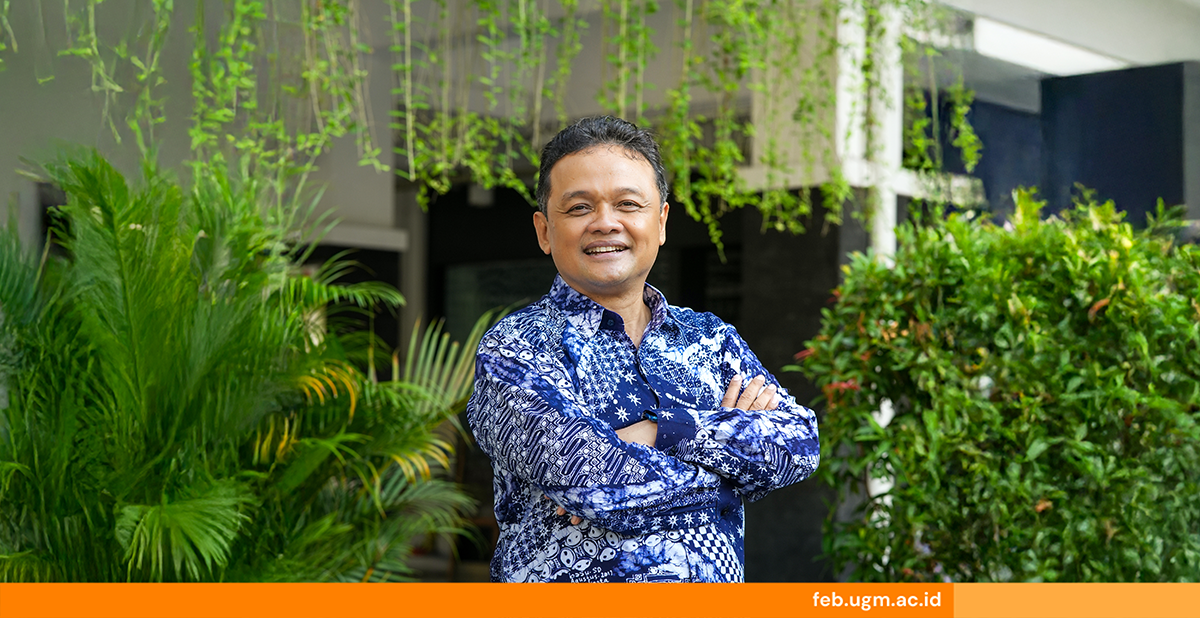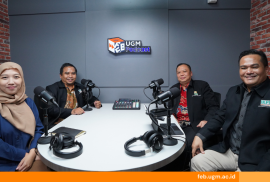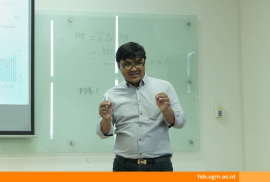
Rimawan Pradiptya, S.E., M.Sc., Ph.D., a lecturer at the Faculty of Economics and Business, Universitas Gadjah Mada (FEB UGM), is an economist widely recognized for his active advocacy against corruption. Recently, Tempo magazine named him one of the prominent figures of 2024 (Tempo, December 30, 2024 – January 5, 2025 issue). His contributions to academia and political advocacy have impacted education, anti-corruption efforts, and preserving Indonesia’s constitutional integrity.
Critique of Corruption Case Handling
As an economist, Rimawan has been instrumental in developing a methodology for calculating the social costs of corruption. He has been studying the economics of crime since 2002 when he worked as a researcher in the United Kingdom. Since 2009, he has been building a corruption database based on court decisions, now in its fifth wave (covering 2001-2018). He also initiated the MSc in Economics of Crime concentration at FEB UGM in 2009.
Rimawan developed a methodology to calculate the social cost of corruption, translating the economic losses caused by corruption. The Corruption Eradication Commission (KPK) has been using this method as training material since 2014, and the Attorney General’s Office adopted it for handling corruption cases in 2020.
This method offers a new perspective: corruption damages public finances and the national economy. It informs the public about the extent of the economic damage caused by corruption. The next question is whether the sentences imposed reflect efforts to repair the financial damage caused. While the court rulings recognize the monetary losses, the sentences imposed have yet to reflect the full extent of these damages.
Rimawan also strongly opposed the revision of the KPK law in 2019. He based his opposition on academic analysis published on the Social Science Research Network (SSRN), a platform for academics to disseminate research. Expressing his views was not without challenges – he faced various threats, including phone hacking. “They hacked my WhatsApp account,” he revealed.
A research team from Diponegoro University later analyzed hacking incidents targeting academics and published their findings in Contemporary Southeast Asia in 2022.
Initiating Academic Movements
Rimawan is known for maintaining an extensive network across various social elements. During the COVID-19 pandemic, he initiated Sambatan Jogja (SONJO; Sonjo.id), a social capital movement using WhatsApp groups (WAGs). At its peak, SONJO reached 30 WAGs with more than 2,300 members. The movement focused on economic recovery through eight programs and health interventions through 14 programs to mitigate the effects of COVID-19.
He actively maintains communication with academics both within UGM and other universities. In 2011, he founded the Gemati movement (Gerakan Masyarakat Akademis untuk Transparansi Indonesia), initially using BlackBerry Messenger (BBM) for communication. In 2017, he played a key role in the UGM Berintegritas movement, which collected over 1,000 signatures from UGM lecturers in support of Indonesia’s Corruption Eradication Commission (abbreviated KPK) KPK’s handling of the E-Indentification Card case and opposition to the Parliamentary Commission of Inquiry (Pansus Hak Angket) against the KPK.
Despite threats, his firm stance against the 2019 KPK law revision demonstrated his courage in defending institutional integrity. In addition, he continues to provide constructive, evidence-based criticism to uphold constitutional integrity. Rimawan has also initiated several WhatsApp groups to discuss various societal issues.
On October 16, 2023, the Constitutional Court’s decision to change the age requirement for presidential and vice-presidential candidates caused unrest among civil society and academics. This decision led to the Bulaksumur Petition on January 31, 2024, initiated by the head of UGM’s Center for Pancasila Studies (PSP), Agus Wahyudi, as a reminder to the government that it had deviated from ethical and democratic principles. Academics from various universities across Indonesia later signed similar petitions.
On March 12, 2024, the Kampus Menggugat (Campus Protests) declaration was held at UGM’s Balairung, involving academics and alumni in response to these concerns. On April 21, 2024, to commemorate Kartini Day, the Kampus Menggugat movement held another declaration at UGM’s Balairung, calling for strengthening ethical values in governance.
Rimawan emphasized that constitutional violations are no longer limited to legal regulations but directly affect the Constitution, the nation’s very foundation. He warned that the Constitution should not be recklessly amended to serve the interests of a few.
He remarked, “If we academics remain silent when the nation is in crisis, we will not act even if the country is invaded,” explaining the motivation behind the movement.
The Role of Academics in Protecting the Nation
Rimawan emphasized the crucial role of academics in educating the nation, as stated in the fourth paragraph of the preamble to the 1945 Constitution. He asserted that the constitutional mandate to educate the nation means making people knowledgeable and fostering integrity.
“Academics may make mistakes, but they must remain honest. UGM, as a university of struggle, must constantly reposition itself – criticizing flawed policies while supporting the right ones,” he stated.
He also stressed the importance of continuous reform. In this context, Rimawan urged academics to consistently promote evidence-based policymaking and be at the forefront of defending democracy.
Through his unwavering stance, Rimawan Pradiptya serves as an inspiration not only to students and colleagues at UGM but also to the broader public. He firmly believes that criticism is an essential part of democracy and that academics are responsible for speaking the truth to improve Indonesia’s future. In this spirit, Rimawan continues to advocate for the active participation of all elements of society, especially academics, in upholding the integrity of the Constitution and fighting injustice.
Reportage: Kurnia Ekaptiningrum
Sustainable Development Goals








